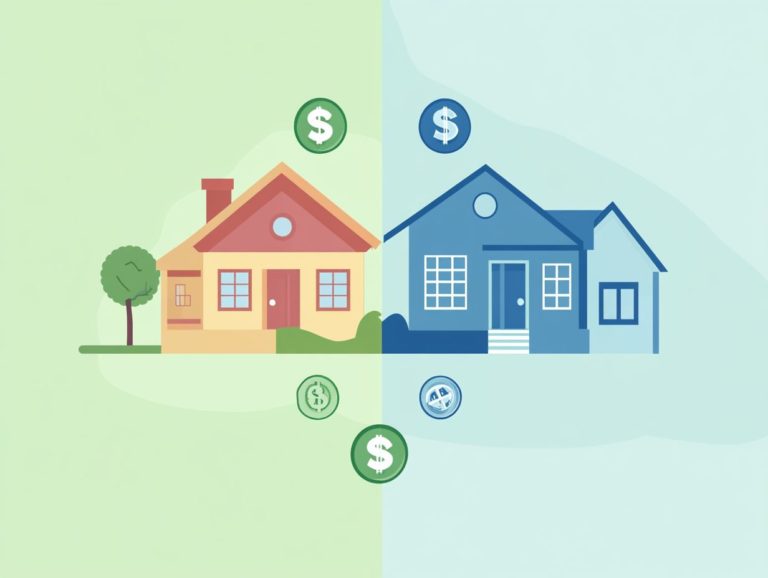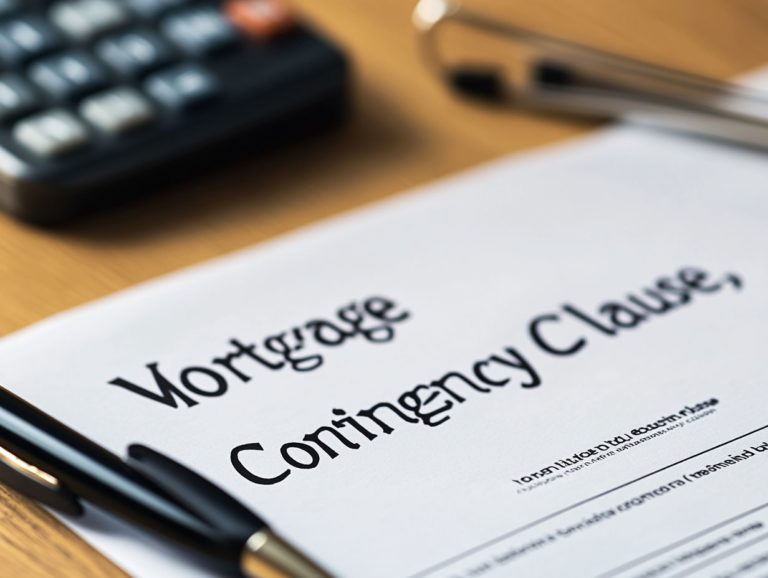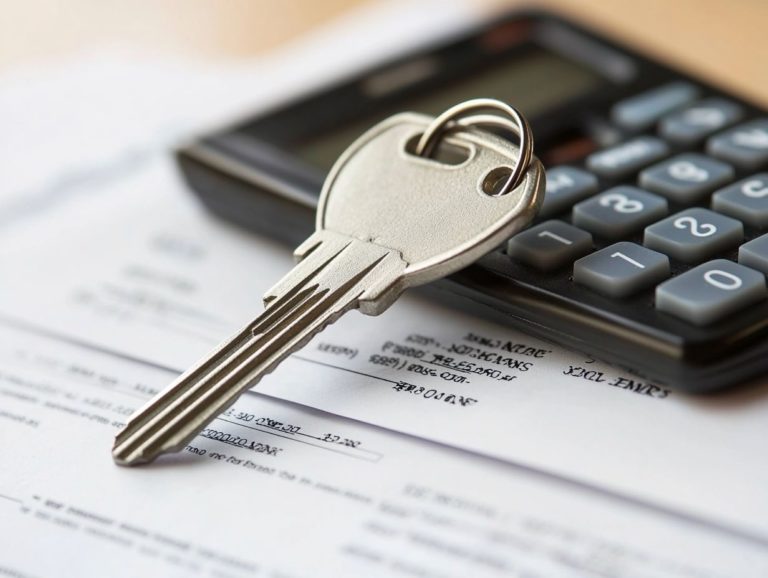How to Get the Best Rate on Your Mortgage
Navigating the landscape of mortgage rates can seem daunting. However, understanding the basics can unlock substantial savings for you.
This article outlines the essential factors that affect mortgage rates, from credit scores to market conditions. It offers a comprehensive guide on preparing for a mortgage, exploring competitive rates, negotiating with lenders, and ultimately securing the best deal.
By the end, you ll be ready to confidently secure the best mortgage for your dreams!
Contents
- Key Takeaways:
- Understanding Mortgage Rates
- Preparing for a Mortgage
- Shopping for Mortgage Rates
- Negotiating for a Lower Rate
- Locking in the Best Rate
- Finalizing the Mortgage
- Frequently Asked Questions
- What factors affect the interest rate on my mortgage?
- How can I improve my credit score to get a better mortgage rate?
- Can I negotiate my mortgage rate with the lender?
- What is the difference between a fixed-rate and adjustable-rate mortgage?
- Should I pay points to lower my mortgage rate?
- What documents do I need to get the best rate on my mortgage?
Key Takeaways:

- Understand the factors affecting mortgage rates, such as your credit score and the amount of debt you owe compared to your income.
- Shop around and compare rates from different lenders, considering fixed vs. adjustable rates, to find the best mortgage rate.
- Negotiate with lenders and consider using rate locks to secure the best rate before finalizing the mortgage.
- Don’t forget to factor in closing costs and fees.
Understanding Mortgage Rates
Understanding mortgage rates is essential for you as a homebuyer. These rates significantly influence the overall cost of your dream home and your monthly payments.
Factors such as your credit score and down payment play a pivotal role in determining the mortgage rates you can qualify for. Staying informed about current market trends and economic conditions gives you the power to make educated financial decisions when selecting a mortgage lender.
Resources from organizations like Bankrate and Freddie Mac can help you navigate these complexities with confidence and clarity.
Factors that Affect Mortgage Rates
Several factors can significantly influence your mortgage rates:
- Credit Score: A higher credit score is often seen as a sign of financial responsibility, enticing lenders to offer you more favorable interest rates. Excellent credit can save you thousands over time.
- Down Payment: The size of your down payment affects both the total loan amount and whether you ll need private mortgage insurance (PMI). A larger down payment may reduce PMI costs, easing your monthly payments.
- Debt-to-Income Ratio: This refers to the amount of debt you owe compared to your income and is a key metric lenders use to assess your creditworthiness.
By carefully considering these factors, you can make informed decisions that lead to long-term savings as a prospective homeowner.
Preparing for a Mortgage
Preparing for a mortgage requires careful navigation, especially for first-time homebuyers eager to meet lender qualifications.
This journey begins with understanding the loan application process, gathering essential documents, and making financial choices that showcase a stable employment history and solid debt management skills.
Each step you take is crucial for ensuring a smooth path to homeownership.
Improving Credit Score and Debt-to-Income Ratio
Improving your credit score and managing your debt-to-income ratio are vital steps in securing a favorable mortgage rate. Lenders closely examine these metrics to assess your creditworthiness.
One effective strategy is to consistently pay down outstanding debts. This not only reduces your monthly obligations but also positively impacts your credit score.
Avoiding late payments is essential; just one late payment can haunt your credit report for years and affect future loan applications.
Understanding the importance of maintaining a healthy debt-to-income ratio empowers you as an aspiring homeowner. Positioning yourself as a strong candidate for approval ensures you can access the most competitive rates available in today s market.
Gathering Necessary Documents

When preparing for a mortgage, gathering necessary documents is crucial. This helps ensure a smooth loan application process.
Mortgage lenders typically ask for proof of income, employment history, and details about your down payment.
Along with these must-haves, it s wise to compile your recent tax returns and detailed bank statements. This collection not only backs up your financial claims but also showcases your ability to manage debt responsibly.
Having everything organized in advance can significantly reduce the time it takes for a lender to evaluate your application and reach a decision. Being well-prepared enhances your chances of securing that dream home, making the often intricate mortgage journey much smoother.
Shopping for Mortgage Rates
Shopping for mortgage rates is a crucial step in your homebuying journey. It gives you the power to compare various mortgage lenders and discover the best mortgage rate that aligns perfectly with your financial circumstances and aspirations.
Comparing Rates from Different Lenders
Comparing rates from different lenders is vital in your pursuit of the best mortgage rate. Even a minor difference in interest can translate into significant savings over the life of your loan.
To navigate this process with finesse, it’s essential to gather loan estimates from several financial institutions. These documents offer a transparent breakdown of interest rates, closing costs, and various fees, enabling you to make direct comparisons.
When evaluating your options, remember to consider not just the rate but also the lender’s reputation and the level of customer service they provide. Approaching negotiations with a well-prepared list of questions can be highly beneficial.
Inquire about potential rate reductions or the possibility of waiving certain fees. By equipping yourself with knowledge, you can secure advantageous terms and ultimately achieve a more favorable financial outcome.
Considerations for Fixed vs. Adjustable Rates
Choosing between fixed and adjustable mortgage rates is an important financial choice that can impact your budget. Each option presents its own set of pros and cons, making it crucial for you to understand the differences at play.
With fixed rates, you gain the comfort of consistent monthly payments throughout the loan term, which aids in long-term financial stability and planning.
On the other hand, adjustable rates may offer lower initial payments that can be enticing, but they come with the potential for fluctuating monthly expenses as interest rates shift.
This variability can introduce an unsettling element to your budgeting process, as you might find yourself facing rising payments down the line. By carefully evaluating your financial situation, risk tolerance, and future plans, you can gain clarity on which mortgage route aligns best with your goals.
Negotiating for a Lower Rate
Negotiating a lower mortgage rate can result in substantial savings over time. Understanding how to communicate effectively with mortgage lenders is essential for reaching this objective.
Tips for Negotiating with Lenders

To successfully negotiate with mortgage lenders for a lower interest rate, you need to come prepared with loan estimates, a solid grasp of your financial situation, and a clear target rate in mind.
Being well-equipped gives you the power to confidently explore your options and present competing offers from other lenders, demonstrating your savvy approach to securing the best possible terms.
By showcasing your strong creditworthiness, you significantly boost your negotiating power. Lenders are more inclined to accommodate your requests for favorable conditions when they recognize your solid financial background.
This proactive strategy not only underscores your determination but also positions you as a serious contender deserving of premium rates, ultimately paving the way for more advantageous financing outcomes.
Locking in the Best Rate
Securing the most favorable mortgage rate is a savvy strategy that shields you from the potential pitfalls of rising interest rates throughout the loan application process.
Understanding exactly when to lock in your rate can save you money. Knowing how and when to take this step is essential for any discerning homebuyer.
Understanding Rate Locks and When to Use Them
Understanding rate locks is essential for you as a homebuyer aiming to secure the best mortgage rate. These agreements allow you to lock in an interest rate for a specified period while you finalize your loan application.
This mechanism not only provides stability amid fluctuating market conditions but also protects you from potential increases in rates during your home-buying journey.
Typically, rate locks can last anywhere from 15 to 60 days. Opting for a longer duration may be wise if you face uncertainty in funding or closing timelines.
It s crucial to be aware of potential fees associated with rate locks, such as extension fees or options for renegotiation. These can significantly influence your financial decisions.
Weighing the costs against the potential benefits of locking in a favorable rate can help you make a more informed choice.
Finalizing the Mortgage
Finalizing the mortgage represents the pivotal moment in your homebuying journey. Grasping the intricacies of closing costs and potential fees will empower you to navigate this stage with confidence, ensuring you’re well-prepared and avoiding any unwelcome financial surprises.
Closing Costs and Other Fees to Consider
When finalizing your mortgage, it s essential to understand the closing costs and additional fees that may accompany your loan. These can profoundly influence your overall financial landscape.
Knowing these costs can be a game-changer for your financial planning as you navigate the often complex closing process, which can be laden with various charges.
As a homebuyer, you might encounter origination fees the fees lenders charge to process your loan and set the stage for your initial borrowing costs.
Title insurance is another key player; it helps avoid issues with property ownership, making it a crucial investment in safeguarding your new asset.
You ll also likely come across escrow fees, which are the fees that keep your money safe during the transaction.
By familiarizing yourself with these components, you equip yourself with the knowledge necessary to make informed decisions, ultimately paving the way for a smoother closing experience.
Frequently Asked Questions

What factors affect the interest rate on my mortgage?
Several factors can affect the interest rate on your mortgage, including your credit score, the loan amount, the type of loan, and current market conditions.
How can I improve my credit score to get a better mortgage rate?
To improve your credit score, pay your bills on time, keep your credit card balances low, and avoid opening new credit accounts. You can also check your credit report for errors and dispute them if necessary.
Can I negotiate my mortgage rate with the lender?
Yes, you can negotiate your mortgage rate with the lender. It’s important to shop around and compare rates from different lenders to have leverage in negotiations. You can also try to improve your credit score or make a larger down payment to get a better rate.
What is the difference between a fixed-rate and adjustable-rate mortgage?
A fixed-rate mortgage has a set interest rate for the entire loan term, while an adjustable-rate mortgage (ARM) has a fluctuating interest rate that can change based on market conditions. Fixed-rate mortgages offer more stability, while ARMs may have lower initial rates but can increase over time.
Should I pay points to lower my mortgage rate?
It depends on your financial situation. Paying points upfront can lower your interest rate, but it also means paying more upfront costs. Calculate the break-even point to determine if paying points is worth it in the long run.
What documents do I need to get the best rate on my mortgage?
You will need to provide various documents to the lender, including your credit report, pay stubs, tax returns, bank statements, and proof of assets. It’s important to organize these documents and have them ready to expedite the mortgage approval process.
Don t miss your chance to secure a fantastic deal!
If you have questions, consider contacting a lender or financial advisor for personalized advice.






